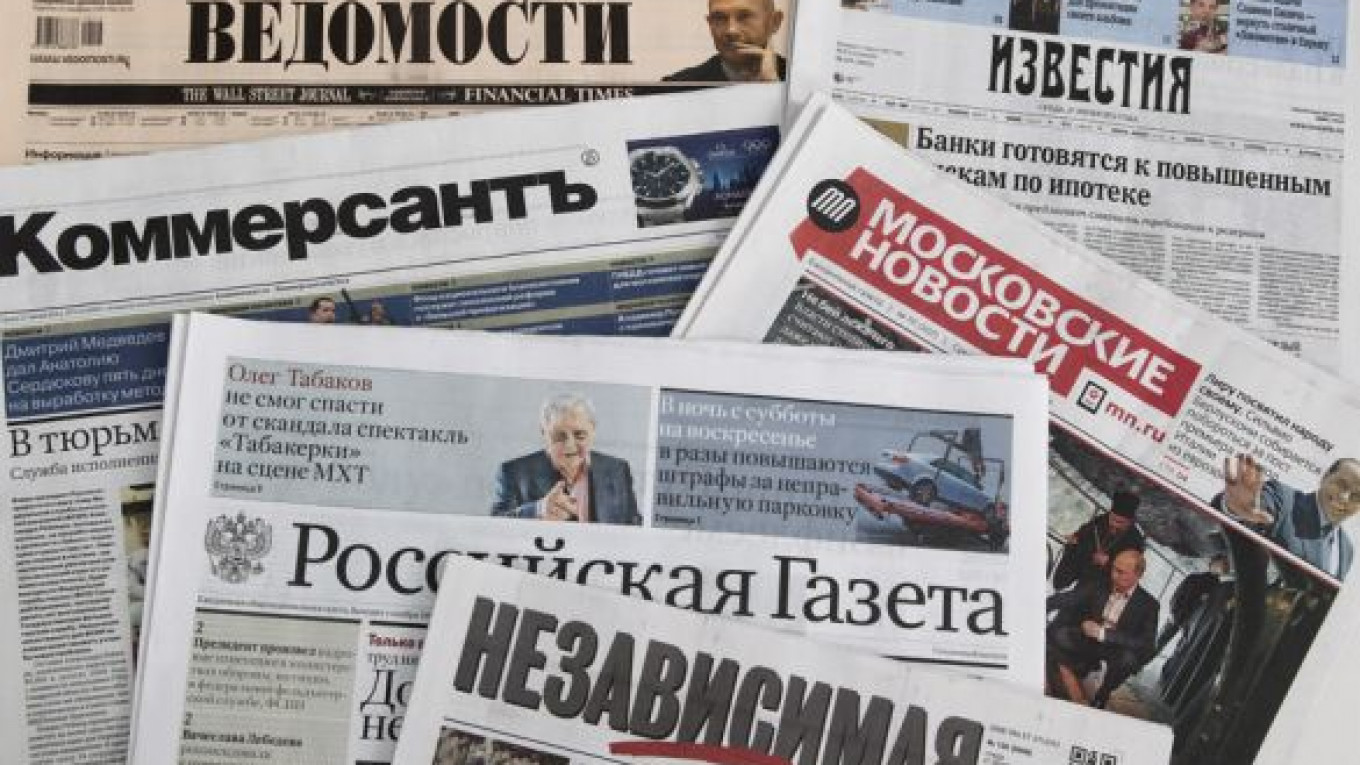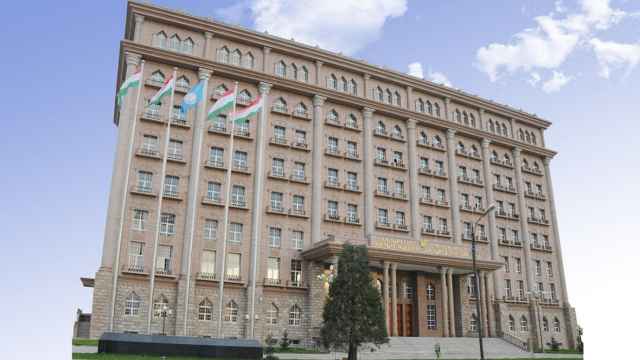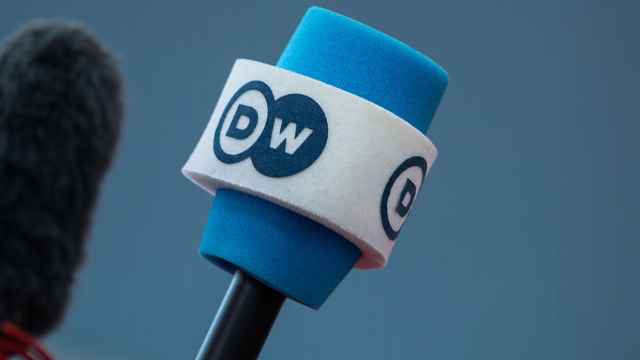Kommersant
1. Anna Solodovnikova et al. article headlined "Rosneft and Gazprom threatened with motherland" says that the heads of Russia's largest oil and gas companies Rosneft and Gazprom have been included in a blacklist of Russians for whom entry to the EU will be prohibited and whose assets in Europe will be frozen as part of sanctions being considered by the EU against Russia over its stance on Ukraine and Crimea; pp 1, 4 (625 words).
2. Ilya Barabanov et al. article headlined "Glory to Crimea" reports on the March 16 referendum in Crimea, at which, according to the preliminary data, about 93 percent of residents have voted for joining Russia; pp 1-2 (2,761 words).
3. Anna Pushkarskaya and Alexandra Mertsalova article headlined "Culture Ministry opens tourism season" gives an account of the tourism forum called "Crimea. First Spring", organized with support of the Russian Culture Ministry, at which the development of tourism in Crimea and Russia's assistance in this was discussed; pp 1, 4 (522 words).
4. Maria Yakovleva and Ivan Kuznetsov article headlined "New old Russian ones" looks at how the pension provision of Crimea as a part of Russia will be organized; pp 1, 4 (790 words).
5. Sergei Bobok et al. article headlined "Kharkiv and Donetsk attracted by Crimea" says that residents of Ukrainian towns Kharkiv and Donetsk have held pro-Russian rallies in support for Crimeans ahead of the March 16 referendum. Demonstrators carried Russian flags and demanded that the Ukrainian government be dismissed and referendums on their own regions' status be conducted; p 3 (618 words).
6. Grigory Tumanov article headlined "Kiev residents' farewell" reports on the situation in Kiev given the referendum in Crimea. A rally has been held there, at which demonstrators agreed that Crimea had been lost, but Maidan protest still remained an effective tool to exert pressure on Ukrainian politicians so that they prevented the separation of new regions; p 3 (803 words).
7. Maxim Ivanov article headlined "Irina Yarovaya guesses moment of history" says that the State Duma committee for criminal legislation has given the go-ahead to a bill introducing criminal responsibility for public rehabilitation of Nazism. Experts consider the bill a step towards the "introduction of single-mindedness" in Russia; p 3 (524 words).
8. Kirill Melnikov et al. article headlined "Price set for Dmytro Firtash" says that Ukrainian businessman Dmytro Firtash, who controlled Russian gas supplies to the country in 2005-2011 and was recently detained in Vienna on request of the FBI, of suspicion of being involved in corruption schemes, may be released on a bail of 125 million euros ($173.8 million); p 4 (450 words).
9. Anastasia Fomicheva et al. article headlined "Plan 'Crimean Stream'" says that Crimea has bought 900 generators in case of power cuts from Ukraine. Meanwhile, Russia is considering a mechanism of proving constant energy supply to Crimea; p 4 (637 words).
10. Anna Pushkarskaya and Irina Nagornykh article headlined "Crimean referendum does not pass check in Strasbourg" says that the Venice Commission has found the March 16 referendum in Crimea to be illegitimate and the Russian bill simplifying the procedure for new constituent parts' joining with Russia nonconforming with international laws; p 5 (669 words).
11. Sergei Strokan article headlined "United measure-inventing efforts" says that the EU foreign ministers will meet today to discuss sanctions against Russia over its stance on Ukraine and Crimea. The EU has made a list of 130 Russian officials who will be banned from entering Europe and whose assets in Europe will be frozen. Also, Russia might be stripped of G8 membership; p 5 (497 words).
12. Article by the newspaper's correspondent network headlined "Cancellation of mayoral elections splits regions" says that mayors of a number of Russia's large cities, including those representing the ruling United Russia party, have criticized a local government reform that would abolish direct mayoral elections in large cities that are divided into districts; p 6 (674 words).
13. Vadim Visloguzov article headlined "Hard landing on 'golden parachutes'" says that the State Duma has passed in the second reading a governmental bill limiting so-called golden parachute compensations paid to sacked heads of state-controlled corporations; p 8 (513 words).
14. Yury Barsukov article headlined "Gas protection" contemplates whether the EU can survive without Russian gas supplies given pending European economic sanctions against Russia over its stance on Ukraine and Crimea; p 13 (1,632 words).
15. Yury Barsukov interview with Sergei Komlev, head of the directorate of pricing and contract structuring at Gazprom Export, headlined "'Europe dependent on gas imports and can do nothing in this respect'", addresses Gazprom's pricing policy on the EU market; p 13 (627 words).
16. Yury Barsukov interview with Jonathan Stern, the head of the Gas Research Program at the Oxford Institute for Energy Studies, headlined "'Consequences will be bad both for EU and Russia'", speaking about gas pricing and the EU's attempts to reduce dependence on Russian gas; p 13 (649 words).
Nezavisimaya Gazeta
1. Tatyana Ivzhenko article headlined "Kiev loses Crimea" says that Crimean Tatars have demanded that the Ukrainian authorities and international organizations give them a right of self-determination, allowing them to set up a national and cultural autonomy forming a part of Ukraine; pp 1, 6 (1,022 words).
2. Vladimir Mukhin article headlined "Forceful acts against peninsula not ruled out" says that holding of the March 16 referendum in Crimea without incidents and outrages does not mean that the new Ukrainian authorities have given up their claims to Crimea and the use of force against the Crimean authorities in future; pp 1-2 (964 words).
3. Gleb Postnov article headlined "Kazan is northern capital of Muslim world" says that the Spiritual Directorate of Muslims of Tatarstan has asked the Rospatent federal patenting body to copyright the slogan "Kazan is the northern capital city of the Muslim world"; pp 1-2 (405 words).
4. Mikhail Sergeyev article headlined "West freezing Russian business" says EU foreign ministers will meet today to discuss economic and visa sanctions against Russia over its stance on Ukraine and Crimea. Meanwhile, according to Reuters, foreign banks have cut loans to Russian business; pp 1, 4 (580 words).
5. Yevgeny Grigoriyev article headlined "Instead of G8 in Sochi, West threatens with G7 in London" addresses the West's initiative to strip Russia of its G8 membership and hold a G7 meeting without Russia, probably in London. The Russian-German summit in Leipzig may also be threatened; pp 1, 6 (705 words).
6. Ivan Rodin article headlined "Russophobia as electoral campaign topic" says that lawmaker Ilya Ponomarev, who will stand for the Novosibirsk mayor's office has described as a ruse the State Duma's move to view his bill making "propaganda of Russophobia" an administrative offense. Ponomarev claims he had revoked the bill. The scandal is linked to Ponomarev's campaign, the article says; pp 1-2 (722 words).
7. Editorial headlined "Why Putin is not afraid of isolation" says that President Vladimir Putin is positioning himself as a leader who does not yield to Western pressure, capable of challenging Europe and the UDS, making sovereign decisions and not leaving his own people. Putin's electorate does not see strengthening of ties with the West as a goal or a value, the article argues; p 2 (509 words).
8. Daria Garmonenko and Alexei Gorbachev article headlined "Crimea warms up intra-Russian protests" reports on an anti-war rally held by the opposition in central Moscow on March 15 and welcomed by the new Ukrainian authorities. A significant number of Russians is condemning the authorities' policy on Ukraine, the article says; p 3 (891 words).
9. Andrey Buzarov op-ed headlined "Way to EU does not mean leaving CIS" says Ukraine is set to begin its CIS chairmanship in less than a month and addresses the obligation Ukraine has assumed as CIS chairman; p 3 (800 words).
10. Alina Terekhova article headlined "Europe looking for alternative gas suppliers" says that the Russian gas giant Gazprom has concluded a contract with the Italian company Saipem to build the first section of the South Stream gas pipeline from Russia to Bulgaria on the bed of the Black Sea. Meanwhile, the European Commission has suspended talks with Moscow on the South Stream gas project; p 4 (783 words).
11. Artur Blinov article headlined "Crimean spring and international cooling" details the diplomatic crisis over the events in Crimea, focusing on the West's reaction to Russia's actions; pp 9-10 (1,100 words).
12. Alexei Fenenko article headlined "Scenarios for Ukraine" speculates about Ukraine's future given its current relations with neighboring states; pp 9-10 (1,100 words).
13. Vladimir Skosyrev article headlined "Beijing not interfering in Moscow-Washington argument" says that Barack Obama has tried to form an anti-Russian alliance with China; pp 9-10 (1,100 words).
14. Sergei Tolstov article headlined "Crimean crisis in context of European security" addresses the Crimean issue from a security perspective; p 11 (1,200 words).
15. Alexander Knyazev article headlined "Maidan scenario for Central Asia" details current threats to Russia's security interests in Central Asia; p 11 (1,100 words).
Vedomosti
1. Anastasia Kornya and Polina Teremina article headlined "'This has not happened since U.S.S.R times'" says that despite all obstacles, the March 16 referendum in Crimea was a success; pp 1, 21 (1,000 words).
2. Editorial headlined "Roam at home" says that Russian people have recently begun to prefer traveling across Russia to trips abroad; pp 1, 6 (400 words).
3. Lilia Biryukova and Yelena Morozova article headlined "Complaints point by point" says that the People's Front for Russia, or ONF, is displeased with the performance of Novosibirsk region governor Vasily Yurchenko and is planning to complain about Yurchenko to Putin. Pundit Vitaly Ivanov considers this to be part of preparations for Yurchenko's dismissal; p 2 (500 words).
4. Svetlana Bocharova article headlined "Confiscation as tool of corruption" says that the head of the State Duma committee for legislation Pavel Krasheninnikov has opposed the ratification of Article 20 of the UN convention against corruption., which envisages seizing property from corrupt officials; p 2 (500 words).
5. Maria Zheleznova article headlined "Great power statehood instead of welfare" says that a public opinion poll conducted by the independent pollster Levada Centre has shown that 63 percent of Russians, the highest amount over the past 15 years, consider Russia a great power. Also, 48 percent of respondents want Russia to be a state that other countries respect and fear than a state having a high living standard; p 2 (300 words).
6. Margarita Papchenkova article headlined "Finance Ministry crosses borders" details a bill introducing heavy taxation for foreign subsidiaries of Russian companies, drafted by the Finance Ministry as part of the fight against offshores in Russia; p 4 (1,050 words).
7. Andrei Ryabov article headlined "Ukrainian factor on post-Soviet space" contemplates implications that the Ukraine crisis may have on the post-Soviet space; pp 6-7 (1,200 words).
8. Dmitry Kazmin article headlined "Person of week: Elvira Nabiullina" says that according to the Federal Reserve Agency, U.S. Treasuries worth $105 billion, owned by foreign central banks, have been withdrawn from its account. Analysts are practically sure that these are securities of Russia's Central Bank and the move is a defensive step by Russia given pending Western sanctions over its stance on Ukraine and Crimea; p 7 (500 words).
9. Konstantin Sonin article headlined "Economic meaning of freedom of speech" comments on the freedom of speech from an economic angle; p 7 (400 words).
10. Yelena Khodyakova article headlined "Gazprom looking for support" says that the Russian gas giant Gazprom is negotiating with its European clients who will probably support for the monopoly in exchange for gas discounts given pending Western sanctions against Russia; p 11 (600 words).
11. Alexei Nevelsky and Mikhail Overchenko article headlined "U.S. looking for substitute to Russia" says that the U.S. wants to reduce dependence on imported oil and worsen Russia's position on the global energy market, but the latter is a hard nut to crack; p 12 (500 words).
12. Tatyana Bochkareva article headlined "Central Bank may have withdrawn $105 billion from U.S." says that U.S. Treasury securities worth $105 billion have been withdrawn from the accounts of foreign central banks in the Federal Reserve Agency. Pundits say that Russia's Central Bank has insured itself against pending Western sanctions against Russia; p 15 (700 words).
13. Roman Dorokhov and Alexei Nikolsky article headlined "Crimean computer campaign" says that Russian, Ukrainian and NATO websites have been repeatedly hacked over the past few weeks; p 16 (400 words).
14. Maxim Tovkailo et al article headlined "How much is Crimea worth?" looks at how Crimea's merger with Russia will reflect on the Russian budget; p 20 (900 words).
Izvestia
1. Boris Mezhuyev interview with Sevastopol "mayor" Alexei Chaly, headlined "'Crimeans should not hang up", speaking about the results of the March 16 referendum and prospects for Sevastopol as a part of Russia; p 1 (464 words).
2. Yelizaveta Mayetnaya and Vladimir Suvorov article headlined "'Someone may not like this, but we are happy'" describes the March 16 referendum in Crimea; pp 1, 3 (1,300 words).
3. Georgy Makovetsky and Anton Sychev article headlined "Games in Sochi to be remembered for Russians' triumphant performance and amazing atmosphere" focuses on the closing ceremony of the Paralympics in Sochi on March 16; pp 1, 5 (712 words).
4. Natalya Bashlykova article headlined "Unity of hearts" says that according to preliminary data, the majority of Crimeans at the March 16 referendum have voted for joining Russia. Experts say that Russia has secured yet another victory on the international arena and has had its image improved against its opponents' expectations; p 2 (997 words).
5. Anastasia Kashevarova article headlined "'I am on EU list because I am patriot of my Russia'" looks at a blacklist of Russian officials whom Western economic and visa sanctions will affect given Russia's stance on Ukraine and Crimea and features comments from Chechen leader Ramzan Kadyrov and Deputy Prime Minister Dmitry Rogozin, who have been put on the blacklist; p 4 (488 words).
6. Yelena Teslova article headlined "Human rights violations need to be investigated" says that the Russian Public Chamber is planning to file complaints to the European Court for Human Rights over what it regards as human rights situation in Ukraine; p 4 (462 words).
7. Natalya Bashlykova article headlined "Russia not to fulfil European Parliament's recommendations" says that the European Parliament has passed a resolution on Russia's invasion of Ukraine, in which it promises to break off relations with the Russian parliament if Russia does not stop the referendum in Crimea and withdraw its troops from the peninsula. Russia has described the resolution as biased, populist and pleasing NATO; p 4 (779 words).
8. Anastasia Kashevarova and Ruben Garsya article headlined "Frontrunner appears in Novosibirsk" says that the Kremlin may back acting mayor Vladimir Znatkov, who is standing in the forthcoming mayoral election in Novosibirsk as a United Russia candidate; p 6 (566 words).
9. Political analyst Mikhail Remizov article headlined "Victim of Crimean campaign" praises Russia's actions in Crimea, but notes that the very fact that Russia has had to take these steps is a result of its failed foreign policy on Ukraine over the past 20 years; p 9 (1,633 words).
10. Writer Alexander Prokhanov op-ed headlined "On main route" looks at the implications of the Crimean referendum for Russia and what changes the Russian political and economic systems should undergo; p 9 (587 words).
11. Opposition activist Eduard Limonov column headlined "Rally of prostitutes" bashes participants of an anti-war rally held by the opposition in central Moscow on March 15 in support for the new Ukrainian authorities; p 9 (587 words).
Rossiiskaya Gazeta
1. Yury Snegirev article headlined "Transparent answers" reports on the March 16 referendum in Crimea, at which most voters chose joining Russia; pp 1, 3 (845 words).
2. Tatyana Zykova article headlined "Sea of Okhotsk is our everything" says that the UN has confirmed that 52,000 square kilometres in the middle of the Sea of Okhotsk, which have been international waters until recently, is now Russian; pp 1-2 (522 words).
3. Igor Yelkov article headlined "Sevastopol waltz" describes the March 16 referendum in Sevastopol; p 3 (801 words).
4. Yadviga Yuferova article headlined "With whiskey and oil, to freedom" looks at preparations for the September 18 independence referendum in Scotland; p 4 (812 words).
5. Alexander Gasyuk and Alexei Gusarov article headlined "Between Pristina and Sevastopol" compares the West's current stance on the secession of Crimea from Ukraine with its stance on Kosovo in the 1990s; p 4 (1,200 words).
6. Anna Fedyakina article headlined "New York-Moscow-Kiev" says that Russia has vetoed a resolution on Ukraine drafted by the U.S. at a UN Security Council meeting on March 15 and describes Russia's proposals to settle the Ukraine crisis; p 5 (897 words).
7. Kira Latukhina article headlined "Economic deterrence" features Russian president's press secretary Dmitry Peskov's statements on the Ukraine crisis and the Russia-West standoff over it made in an interview given to the Ren TV channel; p 5 (564 words).
8. Tatyana Zamakhina article headlined "Maidan's guest performance on Sakharov Avenue" looks at rallies in support for Crimea and against the peninsula's joining to Russia held in Moscow on March 15; p 6 (665 words).
9. Anastasia Keyzerova article headlined "Batalov, Bashmet, Tabakov and others" says that the Culture Ministry has finished collecting cultural figures' signatures for a collective letter in support of Putin's position on Ukraine and Crimea. Overall, 500 celebrities left their signatures; p 6 (517 words).
10. Mikhail Barshchevsky interview with Federal Migration Service head Konstantin Romodanovsky, headlined "You are welcome", speaking about the recent amendments to the law on granting Russian citizenship; p 7 (1,040 words).
11. Natalya Yachmennikova article headlined "Attack in space" says that according to the Russian Telecommunications and Mass Communications Ministry, Ukraine is behind an interference attack on a Russian television satellite; p 7 (407 words).
Moskovsky Komsomolets
1. Marina Ozerova article headlined "Spy scandal in State Duma" says that the scandal involving lawmaker Ilya Ponomarev who has supposedly submitted to the State Duma a bill making "propaganda of Russophobia" an administrative offense is a new dawn for smear campaigning; pp 1-2 (664 words).
2. Tatyana Fedotkina article headlined "Student's waltz 'Russians to branch'" comments on a video clip posted on the internet where a group of young people calls for "hangings of Russians", waving Ukrainian flags, at a rally in Lviv region. This proves that Lviv region, where Ukrainian nationalism originates, determines the agenda of the Ukrainian political life to great extent, the article says; pp 1-2 (629 words).
3. Marina Perevozkina article headlined "Crimea divorces with Ukraine" reports on the March 16 referendum in Crimea; pp 1, 3 (857 words).
4. Natalya Rozhkova article headlined "Secret of red jackets" looks at a rally in support of Crimea joining Russia held by a pro-Kremlin movement in Moscow; p 2 (530 words).
5. Yevgeny Gontmakher article headlined "Authorities score full ride" says that the system of state management in Russia has degraded more than ever; p 3 (1,168 words).
6. Ignat Kalinin article headlined "Ukraine adopts Iran's practice" looks at an information war between Russia and Ukraine; p 3 (417 words).
7. Igor Karmazin article headlined "Kharkiv wants referendum too" examines pro-Russian moods in the city of Kharkiv, eastern Ukraine; p 3 (400 words).
8. Sergei Ustinov article headlined "Genius of all times and peoples" outlines and explains Putin's stance on Ukraine and steps being taken by him in this respect; p 5 (1,103 words).
9. Alexei Baranov article headlined "Ukraine of extremes" portrays the new Ukrainian authorities in Kiev; p 5 (2,570 words).
RBK Daily
1. Stepan Opalev et al. article headlined "Roll up to Russia" reports on the Crimean referendum on joining Russia, at which, according to the preliminary data, about 93 percent of residents have voted in the affirmative. The Russian authorities now need to decide how to formalize the referendum's results; pp 1-3 (1,550 words).
2. Yevgeny Novikov et al. article called "Crimea within Russian pocket" says the financial aid that Moscow will provide to Crimea if its residents decide to join Russia will amount to $3 billion a year. Deputy Prime Minister Dmitry Kozak will reportedly control the distribution of the money; pp 1-2 (1,150 words).
3. Alexei Sinyakov article headlined "Not survived Olympics" says one of the major real estate developers in Sochi — corporation Inzhtransstroy — has announced its liquidation after both the Olympic and Paralympic Games were over; pp 1, 8 (600 words).
4. Alexander Litoi article headlined "Against war, censorship and repressions" reports on the opposition anti-war rally held on March 15 in the centre of Moscow; p 2 (800 words).
5. Vladislav Inozemtsev op-ed headlined " No need to sacrifice Russia for Crimea" forecasts the future of Russia if Crimea becomes a part of it; p 4 (1,500 words).
Tvoi Den
1. Anton Stepanov article headlined "Russia is our motherland" reports on the results of the Crimean March 16 referendum on joining Russia; p 2 (400 words).
2. Anton Stepanov article called "Bloody bastards" reports on the mass riots in Kharkiv blaming nationalists from Ukrainian movement Right Sector for the bloodshed; pp 4-5 (550 words).
Komsomolskaya Pravda
1. Dmitry Nesterov interview with the presidential spokesman, Dmitry Peskov, speaking on the Crimean referendum, possible sanctions from the West and the Paralympics; pp 2, 29 (1,400 words).
2. Galina Sapozhnikova article headlined "Ukraine predicted to turn into Georgia" reports on the reaction in Kiev to the Crimean referendum on joining Russia; p 6 (600 words).
3. Alexander Grushin article headlined "Mobs, have you forgotten Chechnya?" says Right Sector activist Sashko Bily who fought against Russians in Chechnya 20 years ago has asked not to be extradited to Russia where he might face prosecution; p 6 (300 words).
4. Alexander Kots and Dmitry Steshin article headlined "Boycott not taken place" says that a part of Crimean Tatars have cast their votes at the March 16 referendum on the status of Crimea despite the split in the local Tatar community; p 5 (700 words).
Novaya Gazeta
1. Alexei Polikovsky article headlined "There is way out" reports on the anti-war rally held on March 15, on the eve of the Crimean referendum; pp 2-3 (1,800 words).
2. Andrei Lipsky interview with Lev Gudkov, head of Levada Centre, saying that the Russian society does not understand what is going on in Ukraine and is afraid of that; pp 7-8 (1,800 words).
March, 17, 2014 / BBC Monitoring / ©BBC
A Message from The Moscow Times:
Dear readers,
We are facing unprecedented challenges. Russia's Prosecutor General's Office has designated The Moscow Times as an "undesirable" organization, criminalizing our work and putting our staff at risk of prosecution. This follows our earlier unjust labeling as a "foreign agent."
These actions are direct attempts to silence independent journalism in Russia. The authorities claim our work "discredits the decisions of the Russian leadership." We see things differently: we strive to provide accurate, unbiased reporting on Russia.
We, the journalists of The Moscow Times, refuse to be silenced. But to continue our work, we need your help.
Your support, no matter how small, makes a world of difference. If you can, please support us monthly starting from just $2. It's quick to set up, and every contribution makes a significant impact.
By supporting The Moscow Times, you're defending open, independent journalism in the face of repression. Thank you for standing with us.
Remind me later.






